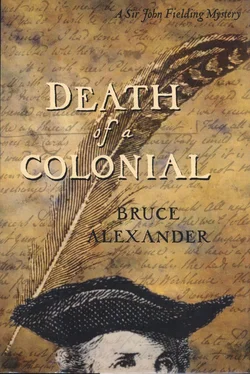Bruce Alexander - Death of a Colonial
Здесь есть возможность читать онлайн «Bruce Alexander - Death of a Colonial» весь текст электронной книги совершенно бесплатно (целиком полную версию без сокращений). В некоторых случаях можно слушать аудио, скачать через торрент в формате fb2 и присутствует краткое содержание. Год выпуска: 1999, ISBN: 1999, Издательство: Putnam Adult, Жанр: Исторический детектив, на английском языке. Описание произведения, (предисловие) а так же отзывы посетителей доступны на портале библиотеки ЛибКат.
- Название:Death of a Colonial
- Автор:
- Издательство:Putnam Adult
- Жанр:
- Год:1999
- ISBN:9780425177020
- Рейтинг книги:3 / 5. Голосов: 1
-
Избранное:Добавить в избранное
- Отзывы:
-
Ваша оценка:
- 60
- 1
- 2
- 3
- 4
- 5
Death of a Colonial: краткое содержание, описание и аннотация
Предлагаем к чтению аннотацию, описание, краткое содержание или предисловие (зависит от того, что написал сам автор книги «Death of a Colonial»). Если вы не нашли необходимую информацию о книге — напишите в комментариях, мы постараемся отыскать её.
Death of a Colonial — читать онлайн бесплатно полную книгу (весь текст) целиком
Ниже представлен текст книги, разбитый по страницам. Система сохранения места последней прочитанной страницы, позволяет с удобством читать онлайн бесплатно книгу «Death of a Colonial», без необходимости каждый раз заново искать на чём Вы остановились. Поставьте закладку, и сможете в любой момент перейти на страницу, на которой закончили чтение.
Интервал:
Закладка:
I did not alter my route — though perhaps, upon reflection, I should have — but went north to my destination by the swiftest, most direct way I knew. Consequently, I arrived a bit earlier than I had expected. The Lord Chief Justice had not returned from his day at the Old Bailey Court — or so I was informed by Lord Mansfield’s butler. Fully expecting to be barred from the house, I took a place a step down from the door, folded my arms before me, and prepared to await the arrival of his coach. Armed as I was, I thought I made a rather imposing figure there. Yet the butler remained standing in the open door and looked critically upon me.
“Do you intend to remain there?” he asked.
“And why not?” said I.
He answered with another question: “Why not take a walk round the square?”
“Because I wish to be here at the moment Lord Mansfield arrives from Old Bailey.”
“Why is it so important that you greet him at his doorstep?”
“So that I may deliver a document.”
“Is it of such importance?”
“Important enough so that Sir John instructed me to shoot if anyone should try to take it from me by force.”
“Oh, I see,” said the butler. “Perhaps you’d better come inside.” I accepted the invitation, even though it was reluctantly given. He indicated that I was to sit on the bench there in the vestibule. I was about to take a place there, when my curiosity demanded that I put a question to him: “Why did you invite me in? I’m not dressed as you usually require for entry.”
“No,” said he, “but you’re wearing pistols.”
“Had you thought I would shoot if I were not admitted?”
“Goodness, no! But it really wouldn’t do to have one such as yourself waiting at the door of the Lord Chief Justice displaying a brace of pistols. It might be thought by the neighbors that you were an assassin.”
“I shouldn’t suppose that Lord Mansfield would care what the neighbors thought.”
“Oh, he wouldn’t,” said the butler, “but I do.”
With that, he left me, and as I watched him go, I thought what an odd sort of man he was. Were all butlers as he was? No, I knew that was not so. Of all the butlers I had known, I believed I liked best the one who served the last true Lord Laningham. His name had been Mr. Poole. I hoped that he and the rest of the servants who ran that great house had managed to find employment in other houses. I had passed by what had been the Laningham residence in St. James’s Street and was astonished to find it boarded up, its hedges in need of trim, weeds growing in a wild swarm — all this in six months. In another six it would be well on its way to a truly ramshackled state. Who would occupy it? Would there ever be a true heir to the Laningham title? What a sad business it was.
Ruminating thusly, I do not believe I heard the butler’s footsteps in the hall until he crossed the open space just beyond the vestibule. Yet the sudden clatter brought me from my reverie and to my feet.
“He comes,” announced the butler in a manner most important. “Did you not hear the horses?”
“Well, yes, I suppose so,” I mumbled. “I must’ve.”
“Stand well behind me as I open the door,” he instructed me. “I’ll not have the master greeted by a man wearing pistols as he enters his own house.”
For all the butler’s concern, Lord Mansfield seemed to pay little attention of any sort to me as he strode through the open door. He growled something unintelligible to the butler and walked past me as if I had not been present. Not wishing to be rude, I nevertheless felt I had to do something to detain him. And so I boldly cleared my throat and coughed.
William Murray, Earl of Mansfield, Lord Chief Justice of the King’s Bench, stopped in midstep, turned back, and looked at me distrustfully. “Well, what do you want?” said he with what seemed a sneer.
“I have a document and a note to deliver to you from Sir John,” said I.
“Well, give it me.”
That I did without greater preamble.
“Must he have an answer immediate?” the Lord Chief Justice demanded. “That is his way, more often than not.”
“No, mlord,” said I. “Except that you recognize the nature and significance of the document, read the note, and agree or disagree to stop off at Number Four Bow Street tomorrow morning on your way to Old Bailey. Your response need not be written.”
“All that, eh? Indeed? Well, let us see what he has given us.” Then did he rip open the document at the seal — and none too gently. “A statement, is it? Who is this fellow, Percival Mobley? Silly name, Percival.”
“If you will but read on, m lord. Who he is should be made clear in the first long paragraph.”
He read on, and, of a sudden, burst out laughing. “Oh, dear!” he exclaimed. “Just see here! This fellow Mobley has quite dissolved our commission, has he not!”
“I would call your attention to the note, Lord Mansfield,” said I. “Sir John warns you of an expected visitor.”
“Oh? Let me see.”
He found the note and perused it rather hastily, nodding, grunting, chuckling, though in a somewhat sinister manner.
“Ah, well,” said he. “Just let him try. He shall discover that I have great powers of resistance. And yes, by all means, lad, tell Sir John that I shall be most happy to look in on him tomorrow morning.”
As I walked out the door and into Bloomsbury Square a moment later, I happened to reflect that if I had done nothing more, I had succeeded in altering the mood of the Lord Chief Justice. He was positively jolly by the time I took my leave.
Upon my arrival at Number 4 Bow Street, Sir John took me aside and told me that in my absence he had been blessed by a visit from the Solicitor-General himself.
“As I predicted,” said he, “he would have the original and accept no ‘Fair Copy’. Indeed, he demanded all copies that had been made, along with the signed original. When I told him that there were no other copies, he made some remark expressing great doubt. When I said to him then, ‘Sir, would you impugn my good word?’ he said, ‘Not your good word, only your good intentions’. And when I told him that the original was unavailable, for it was now with the Lord Chief Justice, he became altogether unreasonable and insisted that I send someone to fetch it back. I did then finally lose my temper. I told him that the statement made by Percival Mobley was material to his trial and belonged with the Lord Chief Justice. ‘And,’ said he, ‘if I have anything to say about it, there will be no trial.’”
Then did Sir John ask me how Lord Mansfield responded to the package with which I represented him.
“He had only to read the beginning of the statement to become most eager to read the rest,” said I. “And as for Sir Patrick, he seemed to look forward to a contest of the wills with the Solicitor-General.”
“I’m sure he does. When Lord Mansfield digs in his heels, it seems none can budge him.”
Yet I had been wondering a question, and I thought it only right to put it to him.
“Sir,” said I, “if I may say so without being judged impertinent, you can be quite as stubborn as Lord Mansfield. Why did you feel it necessary to send the original to him in order to keep it out of Sir Patricks hands?”
“A fair question,” said he. “You will find when you grow to manhood, and particularly if you are a lawyer, that it is a good thing to know the limits of your own power — if only to test those limits now and again. Now, I, as a mere magistrate, am not afforded near so much power as, say, the Solicitor-General. If we consider that the Solicitor-General we have in mind is also well known at court and a friend of the King’s, to the extent that the King has friends — consider all that, and you must concede that as an opponent he would be very powerful indeed. To tell the truth, I am not sure that I have power enough to resist him in this matter of Mr. Mobley’s statement. In less dire circumstances, it might have been amusing to try, but this is too important a matter to turn into such a contest. And so, knowing that the office of the Lord Chief Justice is a much higher and more powerful one than my own, and knowing, too, that Lord Mansfield is specially capable in contests of this sort, I thought him in the best position and better suited than I to fight this out with Sir Patrick Spenser.’’
Читать дальшеИнтервал:
Закладка:
Похожие книги на «Death of a Colonial»
Представляем Вашему вниманию похожие книги на «Death of a Colonial» списком для выбора. Мы отобрали схожую по названию и смыслу литературу в надежде предоставить читателям больше вариантов отыскать новые, интересные, ещё непрочитанные произведения.
Обсуждение, отзывы о книге «Death of a Colonial» и просто собственные мнения читателей. Оставьте ваши комментарии, напишите, что Вы думаете о произведении, его смысле или главных героях. Укажите что конкретно понравилось, а что нет, и почему Вы так считаете.












